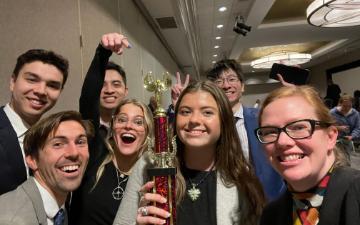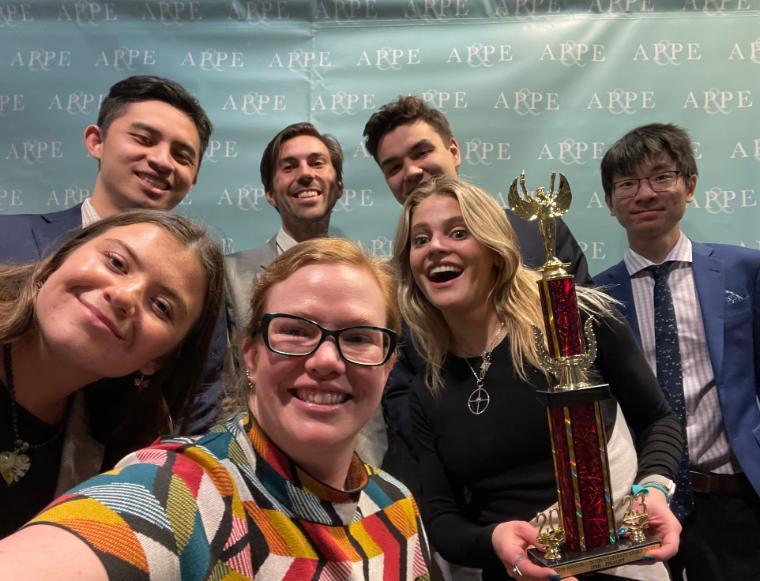
Students and faculty from across the country convene every year to show off their mastery of ethical questions and dilemmas at the National Finals of the APPE Intercollegiate Ethics Bowl®. This year’s edition was recently held in Portland, Oregon, where 36 teams participated at the National Finals from across all the Ethics Bowl regions. Santa Clara University’s Ethics Bowl Team placed among the top four and defeated Stanford University, Oklahoma Christian University, Snow College, and Utah Valley University and tied with the University of Chicago. SCU’s Ethics Bowl Team’s only loss was to the U.S. Naval Academy team, the team which would eventually go on to win the tournament.
This year’s SCU Ethics Bowl Team members were:
- Bailey Black ‘25 (Political Science and Economics)
- Harvey Chilcott ‘23 (Biology, Philosophy, Public Policy, and current Hackworth Fellow)
- Daniel Hipon ‘24 (Philosophy)
- Ariel Perlman ‘23 (Philosophy, Political Science, Public Policy)
- Kendall Schrohe ‘24 (Philosophy and Entrepreneurship)
- Kailai Shen ‘24 (Computer Science & Engineering, Philosophy)
Liam McBride ‘24 (Economics, Political Science, Religious Studies, and current Hackworth Fellow) was also a team member and helped the team qualify for Nationals. Unfortunately, he was unable to travel with the team to the final’s competition. The team is coached by Erin Bradfield, a senior lecturer in philosophy and faculty scholar at the Markkula Center. The team is sponsored by the Markkula Center and the Department of Philosophy.
Bradfield has been the faculty advisor for the team for over five years, acting as a mentor and advisor for the team as a whole. Bradfield’s previous work in consulting with the Ethics Center prepared her to provide expert analysis and aid to the team. She puts together case packs and does preliminary research for the team, identifying frameworks, similar cases, and possible questions in order to provide the team with background information. Some of the team’s meetings are based on understanding the facts, and some are focused on running practice rounds to prepare for competitions.
The team started preparation for their California regional competition during the fall quarter, using cases ripped straight from national news headlines. These real-life, applied ethics cases had been argued over by experts and scholars over the course of the last year, and provided a ripe field for the team to dissect and understand. Bradfield called the process “different from other debate teams,” as the arguments the team had to develop were “not pro-con” but rather focused on figuring out the facts of the case and developing a framework to help address the most possible questions. Since the team has no clue what the questions asked on the day of the competition will be, the team members have to design and utilize frameworks that address multiple questions within a case.

In preparation for the national competition, the team followed a similar methodology, but with one key difference. Because of an unexpected withdrawal from the competition, the SCU Ethics Bowl Team received their bid late, meaning they only had three weeks to prepare for the competition. This crunch, along with the intense competition and preparation necessary for a tournament at this level made the team simultaneously nervous and excited. Ariel Perlman ‘23 said she was “terrified” and that Nationals “felt like a fever dream.” Bradfield saw the nerves in her student’s faces, but all that dissipated once the first match was underway. As Bradfield explained, “It becomes more than just about the cases or the competition, it’s not really about winning.” Of course, winning also feels good. As Perlman explained, “making it to the semi-finals with my team felt unreal.”
Ethics Bowl team members such as Daniel Hipon ‘24 remembered the importance of approaching the cases with excitement and diversity of thought. “We are such a diverse group, intellectually and otherwise, that we can really approach ethical issues with nuance and originality,” Hipon said. Perlman echoed the close nature and importance of the team, saying “I truly consider my teammates some of my closest friends now and I am so grateful for ethics bowl for bringing them into my life.”
While this year’s competition may be over, that by no means signifies that Ethics Bowl is done. “The nature of these cases really make you think about the applications of ethics, and that’s not going to stop when the competition is over,” says Bradfield. The competition is the culmination of months of work, and it is impossible to forget the experience after spending so long focused on ethical frameworks and principles. As both Bradfield and Ethics Bowl alumni have said, “Doing Ethics Bowl makes you change even the way you listen to the news.”
One of Bradfield’s biggest hopes is that Ethics Bowl will gain more recognition and interest from the SCU community on campus. “I wish more people had the opportunity to see how Ethics Bowl works.”
For current students interested in joining Ethics Bowl or learning more about the process, Ethics Bowl meets as a course during Fall Quarters. Ethics Bowl meets as PHIL 185, which fulfills the Civic Engagement core requirement. For more information on Ethics Bowl, contact Erin Bradfield at ebradfield@scu.edu
Lucas Bush ’23, political science and ethnic studies major and a marketing and communications intern with the Markkula Center for Applied Ethics, contributed to this story.
